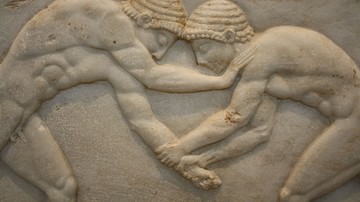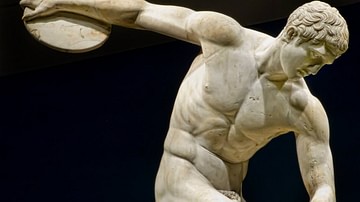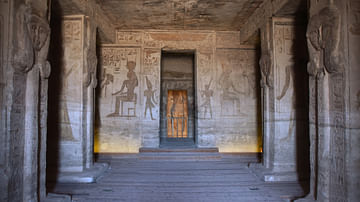Server Costs Fundraiser 2024
Help our mission to provide free history education to the world! Please donate and contribute to covering our server costs in 2024. With your support, millions of people learn about history entirely for free every month.
$3926 / $18000
Latest Content
Featured Definition

Definition
Ancient Olympic Games
The ancient Olympic Games were a sporting event held every four years at the sacred site of Olympia, in the western Peloponnese, in honour of Zeus...
Featured Image

Image
The Diskobolos (Discus Thrower)
The Diskobolos or Discus Thrower, 2nd century CE. Roman copy of a 450-440 BCE Greek bronze by Myron recovered from Emperor Hadrian's Villa in Tivoli...
Free for the World, Supported by You
World History Encyclopedia is a non-profit organization. For only $5 per month you can become a member and support our mission to engage people with cultural heritage and to improve history education worldwide.
Become a Member Donate
Image Gallery
A Gallery of Death and the Afterlife in Ancient Egypt
Death in ancient Egypt was understood as a transition of the soul from the earthly plane to the afterlife, a rebirth, not a conclusion. After death...

Article
Battle of Bir Hakeim
The defence by Free French forces of the remote desert watering hole of Bir Hakeim (Hacheim) in Libya, North Africa in May-June 1942 during the Second...

Image Gallery
A Gallery of Ancient Egyptian Architecture
Architecture in ancient Egypt reflected the Egyptian culture's values, primarily that of ma'at (harmony/balance) symbolized by the symmetry of the completed...

Article
Battle of Gazala
The Battle of Gazala in Libya in May-June 1942 was a decisive victory for German and Italian forces led by General Erwin Rommel (1891-1944) against...

Article
Christianity in Japan
Christianity arrived in Japan in 1549 when Jesuits first set foot in Kagoshima. Initial attempts to spread the religion were met with confusion; however...

Image Gallery
A Gallery of Ancient Egyptian Art
Ancient Egyptian art was created to serve a practical purpose, not for its own sake, and so every piece had a specific function. At the same time, these...

Article
Discovery of X-Rays
The discovery of X-rays – a form of invisible radiation that can pass through objects, including human tissue – revolutionised science and medicine...

Image Gallery
A Gallery of Ancient Egyptian Temples
The temple in ancient Egypt was the home of the deity it was built for, and the clergy attended the statue of that god or goddess as they would a living...

Definition
Michel Foucault
Michel Foucault (1926-1984) was a post-modernist French philosopher and is considered one of the most influential philosophers of modern times. Aside...

Collection
Ancient Egypt: Government & Religion
Government and religion in ancient Egypt were fully integrated beginning with the First Dynasty of Egypt (c. 3150 to c. 2890 BCE). The king was understood...

Collection
Everyday Life in Ancient Egypt
Daily life in ancient Egypt was lived with an awareness of the gods and the understanding that they had given the people the gift of the most perfect...

Definition
Banastre Tarleton
Banastre Tarleton (1754-1833) was a British military officer and politician, most famous for his role in the southern campaigns of the American Revolutionary...

Image Gallery
A Gallery of Ziggurats of Ancient Mesopotamia
A ziggurat is an artificial mountain built by the ancient Mesopotamians to elevate the clergy toward the realm of the gods. A form of monumental architecture...

Definition
Charles Cornwallis
Charles Cornwallis (1738-1805), 1st Marquess and 2nd Earl Cornwallis, was a British military officer and statesman best known for surrendering to George...